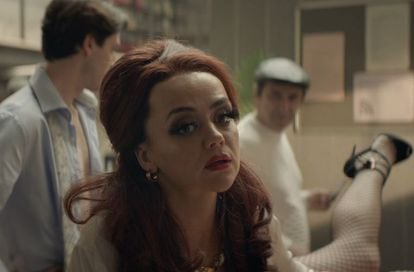Spanish intimacy coordinator of ‘Bridgerton’: ‘The pressure actors are under is terrible’
Alicante-born Enric Ortuño, who has worked on hit series such as ‘Ted Lasso’ and ‘Adult Material,’ talks to EL PAÍS about the challenges of choreographing a sex scene and why the industry needs to do more
/cloudfront-eu-central-1.images.arcpublishing.com/prisa/RPFNEJTJ2BC4FO4JSCE2ENHWX4.jpeg)
Whenever we talk about the filming of sex scenes and their possible impact on the actors involved, the notorious example of Maria Schneider in Last Tango in Paris inevitably comes to mind.
Schneider was 19 when she shot the 1972 movie and, as she later explained, a virgin at the time. Director Bernardo Bertolucci, and Schneider’s co-star Marlon Brando, who was then 48, wanted to blur the line between fiction and reality in order to get an extreme reaction from Schneider. So when it occurred to Brando to use butter as a lubricant in a scene in which his character rapes Schneider anally, both men decided it would be better not to warn the actress. “I wanted her reaction as a girl, not as an actress,” the director admitted some years later. “I behaved horribly with Maria.”
Schneider never got over what happened. Years later, she was to shoot an intimate scene in the erotic historical movie Caligula, but just before the shoot got underway, she suffered a nervous breakdown and was admitted to psychiatric care. Far from supporting her, the film industry painted her as a problematic actress prepared to spoil a shoot. In the 1970s, she suffered from drug addiction and depression and attempted suicide. As far as she was concerned, the scene with Marlon Brando was the underlying cause of her problems. “Even though what Marlon was doing wasn’t real, I was crying real tears,” she said. “I felt humiliated and, to be honest, a little raped, both by Marlon and Bertolucci. After the scene, Marlon didn’t console me or apologize. Thankfully, there was just one take.”
The actress passed away in 2011 from breast cancer and did not get to see any of the very recent changes in the industry. Paradoxically, these changes are thanks to the man who did much to make the lives of actresses a living hell: US producer and convicted sex offender Harvey Weinstein. After his abusive antics became a matter for the courts, cinema and streaming platforms began to seriously consider – for both ethical and legal reasons – the need to work with an intimacy coordinator. This figure is responsible for reaching agreements with actors, and choreographing the sex scenes to make them narratively more interesting, but also less traumatic for actors.
The most powerful actors’ union in the United States, the Screen Actors Guild-American Federation of Television and Radio Artists (SAG-AFTRA), defines an intimacy coordinator as “an advocate, a liaison between actors and production, and a movement coach and/or choreographer in regards to nudity and simulated sex and other intimate and hyper-exposed scenes.”
Today, virtually all big-budget series and an increasing number of movies have an intimacy coordinator among their credits, although film has lagged behind TV in this respect. Perhaps the best-known intimacy coordinator is Ita O’Brien, the Brit who choreographed sex scenes in series such as Sex Education, Normal People and Gentleman Jack. Her name became known beyond the confines of the industry when director Michaela Coel dedicated her BAFTA award for I May Destroy You to O’Brien. “I want to dedicate this award to the director of intimacy Ita O’Brien,” she said at the awards ceremony. “Thank you for your existence in our industry, for making the space safe, for creating physical, emotional and professional boundaries, so we can make work about exploitation, loss of respect, about abuse of powers, without being exploited or abused in the process.”

What is not so well known is that another of the most in-demand intimacy directors, working on series such as Starstruck, Bridgerton, Adult Material, The Girlfriend Experience, Domina and The Nevers is Spaniard Enric Ortuño, from Alicante province, who, like almost all his colleagues in this fledgling profession, came to it by chance.
Trained in theater, he had been traveling to London every year to take courses in areas such as fencing and movement. “Then, in 2018, I was lucky enough while in the US to meet the three women who were blazing this trail,” he explained at the Serielizados Fest festival in Barcelona. “I had always been interested in this world, as a choreographer and assistant of body expression on stage. It’s such a new job and everyone has come to it from a different place. There are people who come from the world of costume, but most of us come from choreography or dance; from some type of physical work.”
Given the job in hand, Ortuño’s personal credentials make him something of a curiosity in the profession. “I’m a middle-aged heterosexual cisgender white male,” he says, almost regretfully. “And this job is 90% about protecting those who aren’t. I’m aware of that and it’s complicated. Sometimes the producers who hire me have to think about this. I could choose not to do the job but I also know that I can help performers have a better experience and, so far, I’ve always had good feedback.”
A common misconception when it comes to intimacy direction is that almost everything takes place on set, such as agreeing on how much is covered by a sheet or how far a tongue goes into someone’s mouth. In reality, that’s only a small part of what an intimacy coordinator does, since set time is expensive. The work starts much earlier, when the script is sent to the actors and the so-called intimacy riders or clauses concerning how each sex scene is going to be approached are negotiated. In the case of big productions, that’s where the lawyers representing everyone from the producers to the actors come in. “I had to learn about this because I had no legal training, but, yes, I spend a lot of time retouching and returning contracts to all parties,” says Ortuño. Often, at this stage of the process, the production team puts pressure on actors reluctant to shoot a scene, using the oldest trick in the book: if you don’t do it, there are plenty of others who will.
Ortuño talks about the recent case of an actor he worked with who was reluctant to show his buttocks. He was told that if he didn’t, he would be fired. Eventually, an agreement was reached. “In this profession, you’re only as good as your last project,” says Ortuño. “The pressure is terrible. They think they’re not going to be recommended; they think they’re going to be vetoed. It puts actors in a very vulnerable position.”

Ortuño also likes to make clear that he is not a censor or an agent of puritanism on set; on the contrary. “If your scene needs 20 people having an orgy and it’s necessary for your story, great, but let’s shoot it professionally,” he says. “It has to be established during casting, rather than letting the actor know when they are already on set, which is something that used to happen a lot before. And once we’re shooting, we need to get the protocol right, with a closed set and a reduced crew, so it is seen by a minimum number of people.”
Since the intimacy coordinator is such a new figure in the film industry, there is a generational gap between young actors, who believe shoots have always been this way, and veterans, who are used to a different modus operandi. But most veterans have welcomed the new approach with open arms. “In the old days there was a lot of secrecy, everything was talked about in hushed tones and the actors were tortured by certain things,” says Ortuño. There are two recurring situations: actors, or “performers with external genitals,” who are scared of having an erection on set; and “performers with internal genitals” who are afraid of getting their period when an intimate scene is to be shot. Both things happen, and a lot. And the job of the intimacy coordinator is to navigate these situations so that everything goes as smoothly as possible for everyone.
“Acting is a psychophysical process and the body doesn’t know you’re lying,” Ortuño explains. “Your body actually reacts. It’s quite possible that there will be a reaction to friction and the actor will get an erection. That can’t be foreseen; it’s a primary instinct. So what do we do? If necessary, we stop shooting for five minutes. In addition, the actors wear an intimacy garment [a kind of protector that covers the penis and testicles] and sometimes a silicone barrier is added. In the case of actresses who have their period, we try to make it so a tampon or a pad can be used by modifying the choreography of the scene.”
The ultimate goal for many intimacy coordinators goes beyond protecting actors. After all, there are controversial cases much more recent than Maria Schneider’s. When actresses Léa Seydoux and Adèle Exarchopoulos confronted Abdellatif Kechich, the director of the 2013 film Blue is the Warmest Color about his handling of theirs sex scenes in the movie, he ridiculed them and told them that construction workers had it worse.

What intimacy coordinators aim for is to change the way sex is incorporated into series and movies. “What we have seen so far in general cinema is only a very small part of human sexuality,” says Ortuño, referring perhaps to the classic heterosexual sex scene which shows the actress’ breasts and just the male torso. “We are trying to work out how to expand it. I don’t have the power to change a script, but I do try to have conversations. I’ve been working on several anal sex scenes lately and I always insist that they include a shot of stimulation and lubrication beforehand. Maybe the director isn’t interested in spending five seconds on that, but I am there to point out that those seconds of stimulation can be just as erotic.”
Ortuño is referring to the controversy surrounding a scene in the fourth season of the Spanish series Élite in which two actors have anal sex without any prior lubrication, prompting a slew of viewers to point out how flawed the depiction was. Sometimes Ortuño wins battles on set, but loses them in the editing room. That is, the scene is shot as he suggests, but then those extra seconds disappear in the final edit.
In the meantime, the credits on his IMDB page are growing. Most recently, he has been on set in Manchester where they are shooting the adaptation of Dolly Alderton’s book, Everything I Know about Love for the BBC. It is a romantic comedy quite removed from his other projects pending release, such as the Netflix fantasy series The Sandman, based on the books by Neil Gaiman and The Wheel of Time, on Amazon Prime. But whatever the series or movie, his ultimate goal is to make the sex scenes more interesting while ensuring the actors feel safe.
/cloudfront-eu-central-1.images.arcpublishing.com/prisa/P5P2MDUGNZCUVJNS4RQK6FSY4Q.jpg)
/cloudfront-eu-central-1.images.arcpublishing.com/prisa/TSBDGKOROFGGO5WZUAGIM6TBO4.jpg)










































